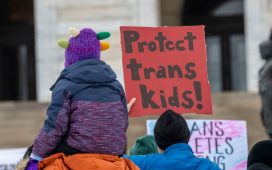Netflix made many, many headlines last week after doubling down hard on Dave Chapelle’s egregiously transphobic new special. The streamer fired B. Pagels-Minor, who is Black, trans, and pregnant, for allegedly leaking internal data on the Chappelle special, an accusation that they’ve vehemently denied. Of course, their firing couldn’t possibly have anything to do with the fact that they were a leader of the Black and Trans employee resource groups, and that they had called for an employee walkout the same day they were fired.
But Netflix firing Pagels-Minor didn’t stop the momentum, with employees walking out of a Los Angeles office on October 20. The trans employee resource group also created a list of demands to repair for the harm caused by the Chapelle special, including the creation of a new fund specifically for trans and nonbinary talent, calls for sensitivity readers for controversial content, and recruiting more trans people for leadership roles. As tech reporters have pointed out, this is a massively unprecedented show of worker solidarity that would have been “unthinkable” within the tech industry just a few years ago. It comes in the midst of a massive labor movement across industries, including Hollywood and tech, at which Netflix sits squarely at the intersection.
Interestingly, tech-focused and more mainstream publications are writing about the walkout as a labor issue primarily, with headlines citing a “wave of tech activism” and “The Rise of Worker Activism.” LGBTQ+ publications, meanwhile, are primarily discussing it as an issue of representation, with many (including this one) citing the streamer’s original documentary about trans representation, Disclosure, as evidence for the real-world harm that negative representation can cause. Both framings are correct, and equally necessary to understand the full picture. But it seems as though they rarely intersect when it comes to media coverage, including LGBTQ+ media coverage.
For example, many publications have covered the numerous fast food worker walkouts of this past summer, and in Time’s words, labor unions are “having a moment.” But very few of these articles address how LGBTQ+ workers, and especially trans workers, are uniquely affected, despite the fact that trans people are nearly three times as likely to be unemployed as the general population and an estimated 2 million LGBTQ+ workers are in restaurants and food service.








